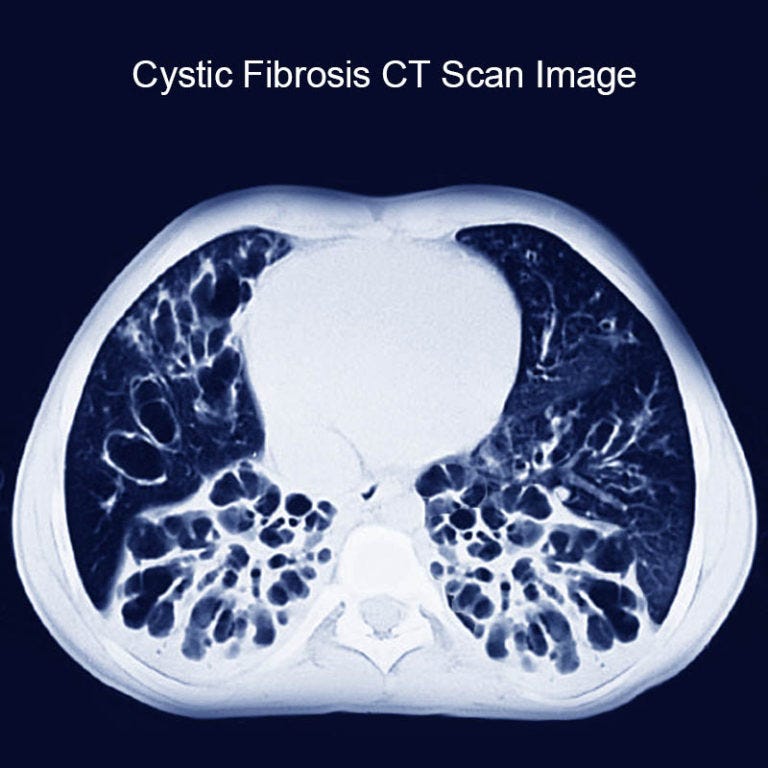Cystic Fibrosis
Written by Sai Koppada
Overview
Cystic fibrosis is a genetic disorder that affects a person’s respiratory and digestive systems. This condition causes the body to produce abnormally large and sticky mucus that can block pathways in the lungs and parts of the digestive system. The clogged airways heighten a person’s susceptibility to infections and cause severe respiratory problems.
Cause
This genetic condition is caused by a mutation in the CFTR (Cystic Fibrosis Transmembrane Conductance Regulator) gene which is responsible for producing a protein that regulates the flow of salt and water into and out of cells. In a healthy individual, the CFTR gene instructs specific proteins to create channels through which chloride ions (ions that makeup salt) can cross the membrane wall of cells, aiding in the creation of bodily fluids such as saliva, mucus, tears, and certain digestive enzymes. Generally, the movement of ions into and out of the cell helps maintain balance and ensures that the bodily fluids produced can easily move through the body.
However, when an individual contains a mutated or defective CFTR gene, the transport of salt and water through the cell membrane is impaired, leading to an imbalance in the concentration of each one. This causes the body to produce fluids that are abnormally thick and viscous.
Respiratory System
In the respiratory system, the thick mucus can accumulate over time and eventually block vital structures in the lungs, such as the bronchioles. In some cases, this buildup can completely obstruct the air passages, causing serious damage to both the airway and small structures surrounding the airway. Under normal circumstances, mucus and other obstructions would be cleared out by tiny hair-like structures called cilia. However, because the mucus is abnormally thick, the cilia cannot effectively clear out the airways causing the person to be more susceptible to infections and bacterial growth. This can lead to tissue damage in the lungs and inflammation, and it can even lead to other chronic conditions.
In severe cases, cystic fibrosis can lead to respiratory failure, where lung tissue becomes so damaged that it can no longer function, and pneumothorax, where air leaks into the chest cavity due to blocked airways. The condition also increases the risk of bronchiectasis, where an individual’s bronchi become severely inflamed and infected, causing breathing difficulties and other serious issues.
Digestive System
In the digestive system, the abnormally thick mucus can block ducts, close off entry into the intestines, and prevent the absorption of vitamins. The mucus can clog ducts that leading to organs like the pancreas and liver, stopping these organs from releasing enzymes needed for proper nutrient absorption. It can also block small structures such as bile ducts, causing irreversible liver damage. Additionally, when the mucus enters the intestines and causes obstructions, it prevents essential vitamins and certain fats and proteins from being absorbed by the body. This leads to problems with malnutrition and vitamin deficiencies.
Overall cystic fibrosis can block many of the vital pathways in the body causing serious complications with breathing, digestion, and nutrient absorption. The thick mucus that it produces can even cause irreversible damage to the organs that it accumulates around.
Treatment and Prevention
Unfortunately, Cystic fibrosis is a genetic condition with no known cure, however, there are various treatments available to manage its effects. The most common treatments for those affected with this condition are inhaled medication and airway-clearing techniques that aim to provide extra support in clearing pathways blocked by mucus in the body. Based on the severity of the condition, there are more rigorous treatments available such as targeted therapy.
References
Chalmers, Sarah. “Cystic Fibrosis - Symptoms and Causes.” Mayo Clinic, Mayo Clinic, 23 Nov. 2021, www.mayoclinic.org/diseases-conditions/cystic-fibrosis/symptoms-causes/syc-20353700.
Written by Sai Koppada from MEDILOQUY


